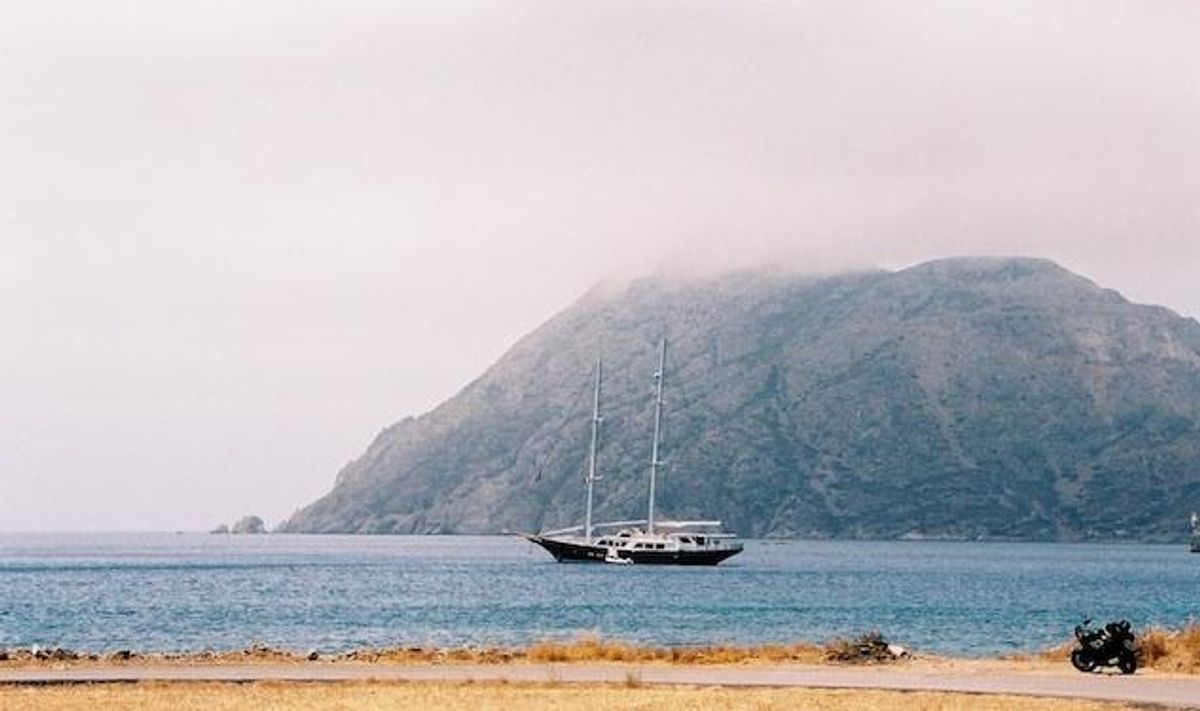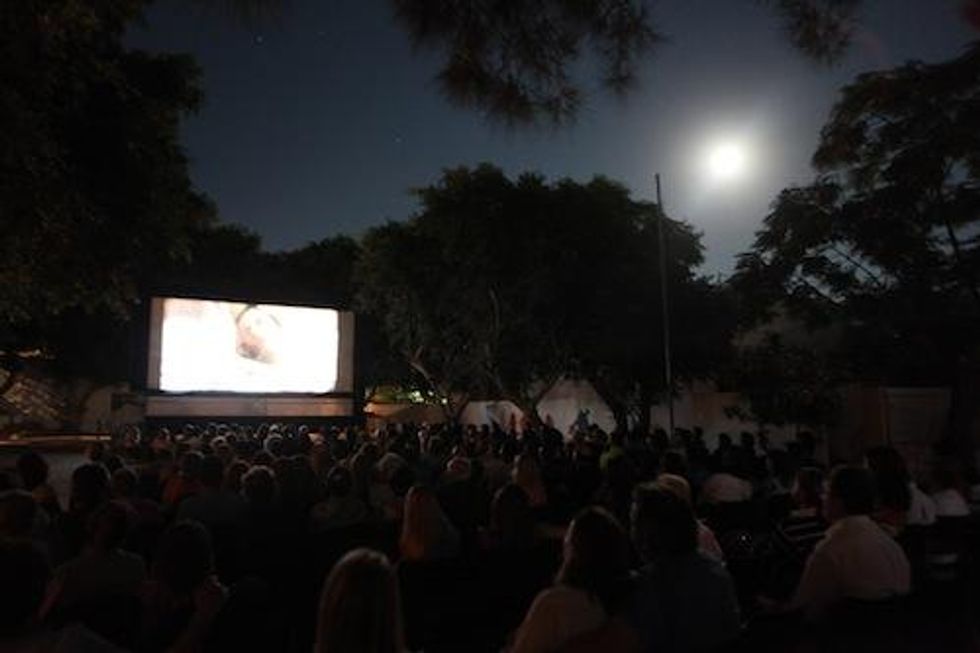Travel & Nightlife
Patmos, Payne, and Paradoxes

In Greece for the International Film Festival of Patmos, discussing life's big questions with filmmaker Alexander Payne
August 16 2013 11:00 AM EST
October 14 2015 10:22 PM EST
By continuing to use our site, you agree to our Private Policy and Terms of Use.

In Greece for the International Film Festival of Patmos, discussing life's big questions with filmmaker Alexander Payne
Is there a God? Life after death? An apocalypse in store for us? Age-old questions crossed my mind on the ferry approaching Patmos, the Aegean island surmounted by a 1,000-year-old monastery, a fortress that summits the island's stony landscape and local life. Patmos is mentioned in the Book of Revelation. John the Apostle was here when he got visions he logged in the scariest book of the New Testament. The cave where he allegedly had his prophecies is on the road from the port to the main town, a snaking lane swimming in churches.
Despite its despotic rulers, Patmos is a destination for nonconformists. Writers, artists, eccentric thinkers and scientists, lots of them openly gay, have been flocking the island for decades. Their symbiosis with the doctrine makes Patmos somewhat of a paradox. Why leather sandals and linen scarves wearing provocateurs (few A&F and Havaianas around) nest under the grand monastery? Are they spellbinded?
As a gay man and a scientist, I have issues with Orthodox churches and spells, but I am also attracted to paradoxes. So when I was invited to the 3rd International Film Festival of Patmos (IFFP) last month, I welcomed the opportunity to understand the magnetism between creativity and canon. Leaving the fun of the Cycladic islands behind--Patmos's Chora has one and a half bars--I checked into my hotel and started watching people who watched movies. The setting was out of Cinema Paradiso but the crowd was different. Monks (who launched the festival), artists, locals, vacationers, and media people squeezed together to experience art under the stars.

"I picked on that excitement," I said.
"We have a beautiful audience," Steve said modestly. "The rest 50% is insiders and fancy world travelers."
"Quite a combo," I said. "Hamish Bowles or Aga Khan flanked by the local baker and a priest as they watch Before Midnight...Study their body language and you got some serious marketing research."
"That's Patmos," Steve said shyly. I could see him putting at ease monks, sponsors, actors..."The island is perfect for mixing and networking," Steve went on. "This already happens but down the road the semiotic diversity that you spotted could help distributors make decisions."
"Let's talk about the program," I said. "What's the festival's underlying theme?"
"Yes, we were careful. We had to be both edgy and mild so locals, experts, and travelers would all be interested. We looked for social and human films. Films about character development, like Alexander Payne's films. And injustice. We included No, Beasts of the Southern Wild, The Angels' Share, LittleLand, Pad Yatra: A Green Odyssey. IFFC is a response to what is happening to Patmos and Greece. And to the world."
I was infected by Steve's tender empathy. "Right here, right now, this makes perfect sense," I agreed. "But when you are a small festival you can go anywhere." I point up at the monastery. "There are plenty of beautiful islands where you can expose locals to art without permission from their guardians."
"Interestingly enough we welcome the constraint you refer to," Steve said carefully. "This year we sponsored young filmmakers to make eight shorts titled Life in the Borderlands. Residents of the island are their subjects. Borders engulf social and personal boundaries too. One short is about a monk who left his career as a ballet dancer to join the monastery. I think it's an amazing story for Greece."
"For anywhere," I mumbled, wondering why do I need to segment the open-minded from the dogma? Science has beefed up its research for evidence of God since I left Stanford. "Many, many years after you left campus," I told Alexander Payne, rolling my eyes.
Payne smiled. His Greek is limited, but he has a good accent from his mother. "Foreign languages are the only thing I'm good at," said the director/screenwriter (Election, About Schmidt, Sideways, The Descendants) who hasn't made a single bad movie. My turn to smile.Payne was back from a long hike on the island with his girlfriend, Grace, but under their sweat and dust they still projected American health and stamina. We ordered cold drinks. It was sunset.
"I have to bring up Election," I told Payne. "I was in New York when it opened and word of mouth spread like fire. People went: What was that?"
"The high school film?" Payne asked perplexed. It took us a few to pin each other's humor. "No, seriously now, it's the movie I get the most complements for. I didn't know New York responded so well. I wasn't there." Checking with Grace, "Were you?"
"Oh, yes!" Grace said. "There was buzz."
"In a way Election exposed us," I said. "Whether people identified with Broderick or Witherspoon the story reminded us that deep-deep down, somehow, something didn't go exactly as planned for lots of us to end up in New York."
Grace nodded. She went to school in my hood in New York. "Election was a Greek tragedy played out in a high school," she said.
"It's set up as a Greek tragedy from its very first minute," Payne intervened. "The voice-over says: You can't fight destiny because it's going to happen anyway, and all you'll accomplish is to suffer."
"So Woodyallenesque," I said.
"So Aeschylusesque," Payne corrected me.
True. We were in the Aegean. Why the middleman? But then we Greeks have been making it and screwing it up 3,000 years now 'cause we can't stand each other. I brought up Payne's long-term workmates, his forever-writing-partner, Jim Taylor, and cinematographer Phedon Papamichael, who was also at the festival. They work splendidly together--from scripts, to movies, all the way to the Oscars. What was Payne's secret to teamwork?
"Well..." he paused, "I wish I could say something profound here, but I think that partnerships are basically luck. Sometimes just laziness. Sometimes you are just too lazy to bother to look for something different. Yes. Laziness."
I stare at him. There was no trace of slugging in his eyes. No trace of bullshiting either. "What happened those 7 years between Sideways and The Descendants?" I asked. "Were you hibernating? Downtime? Just lazy?"
"I was writing," Payne said. "I wish I made movies, I wanted to make movies, but you need a solid story. I took the time to write a different kind of a script, something more visual, something that finally didn't play out and I worked on The Descendants. You know, it's all about the script in the movies. And good casting. The rest..." he waved his hand dismissively.
"That simple, eh? So why the push for black-and-white on Nebraska?" Payne's new film to be released in 2013. "Couldn't someone accuse you of showing off there?"
"No. It's not bells and whistles. I fought for that. Black-and-white is pretty much all I watch. Don't get me wrong, there are many shitty black-and-white films, but there are spectacular ones too."
He is one of the five or so independent filmmakers that work with studios. Something that allows Payne to bring mainstream audiences to indie work. Now he has reached the point where he can make something as close to as possible to his vision. Nebraska's budget went down, but black-and-white was nonnegotiable. Cannes-praised and without a box-office-cast, Nebraska narrates a father-son road trip. Finally reaching equilibrium in my relationship with my father, 25 years after I left Greece, what more could I want from a movie? So here I am, in Patmos, under the monastery, eating up Payne's vision, Payne's way of registering the world, his "internal modeling" according to cognitive scientists who suggest that our souls exist after death because we pass our very models to the world through our sayings and actions, knowing that when all is said and done there'll be much more of Payne's soul around than of mine, as there'll be more of Aeschylus' than Payne's My ego hurts. I need to man up and suck it up. Take from Payne's models, abstract them, and pass them on. Just as he takes from mine.
"I'm curious about what's next in the pipeline, but actually I have a suggestion," I said to Payne. He gestured encouragingly. "Circling back to where we started, in Election there were two small accidents that changed the lives of your protagonists."
Payne was interested but lost. "What accidents?" he asked.
"Broderick misses the garbage bin and Witherspoon falls from the chair while fixing a poster. In a way these mishaps trigger things that change everything in their lives."
"Right on." Payne nodded.
"There are presumably minor accidents that can change the lives of millions," I went on. "Chaos theory can arch stories that take us from the micro to the macro, from human to society."
"I like the chaos theory amplifier you bring up," Payne said. He turned to Grace and asked if she had seen the film I mentioned as a proxy. "Let's watch that," he prompted--even though it's in color. We talked about the screening of Nebraska in New York. I can't wait, but what I really can't wait to see is a Greek story from Payne. A Greek amplifier. He is considering working in Greece, his way of giving back. My way of giving back: stay up all night and hike to the cave of the Apocalypse at dawn.
The pink color was breaking behind the hill as I approached the site. Dogs, chicken, and birds appeared and disappeared between the rocks. One second their eyes stared at me, and then they were gone choreographing some rural magic. I hadn't sensed such vibe since I got lost while driving in Trinidad and Tobago. Reaching the cave, I felt a sudden fear, and I got it: Instigators who come to Patmos long for the preserved mysticism of orthodoxia as others may long for Buddhism or Kabbalah--now way overexposed. I don't know how gray Patmos' magic feels to its regulars, I don't know magic, I don't think I believe in magic, but I can tell it is primitive, worth their hike.
Want more breaking equality news & trending entertainment stories?
Check out our NEW 24/7 streaming service: the Advocate Channel!
Download the Advocate Channel App for your mobile phone and your favorite streaming device!